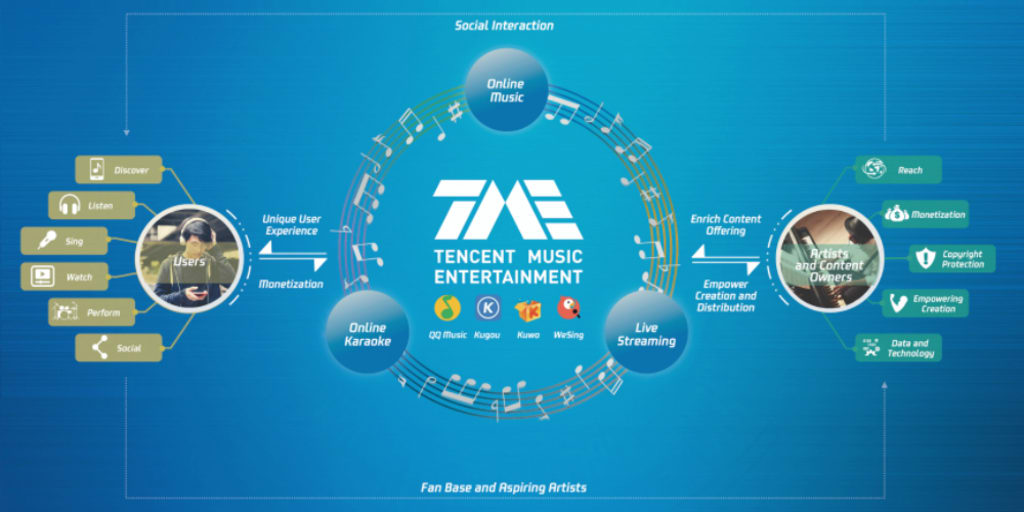There Are Two Big Mountains on the Back of Online Music. How Can Tencent Music Break?
Recently, Tencent Music, NetEase, Baidu, and Alibaba, the online music "TNBA" market structure, decisively dropped the "NBA" in October.

Recently, Tencent Music, NetEase, Baidu, and Alibaba, the online music "TNBA" market structure, decisively dropped the "NBA" in October. On the 2nd, the company officially submitted a prospectus in the United States, the stock code "TME", and will be officially listed on October 18. According to outside estimates, its valuation will reach about 30 billion US dollars; Tencent Music will also become an online music field, the first listed company.
But at the same time, its parent company Tencent is mixed. On the morning of October 11, Tencent's share price opened more than four percent, the lowest 268 yuan, setting a new low in 15 months. This is Tencent's stock price decline for the 10th consecutive day since September 27, setting a record for the longest losing streak after Tencent's listing. In contrast at the end of 2017 Tencent's market value exceeded four trillion, ranking among the top five market capitalization companies in the world. Now, the market value of Tencent has fallen to 2.6 trillion yuan, which has fallen out of the top ten market capitalization companies in the world.
Online music is a traffic entry that runs on the Internet?
In the current era of fast-paced life, the time people can enjoy audio-visual entertainment becomes more and more scarce, and between this video and audio, audio is one of the oldest and original ways of information communication. Born to have the media advantage of content communication, as the media theorist McLuhan said in Understanding Media, oral communication can directly express the innate advantages of ideas and ideas without the aid of visual information, such as text symbols.
Coupled with the accompanying features of audio carriers, and the continuous optimization of mobile music application experience, and the continuous upgrading of personalized services, mobile music applications have gradually become one of the indispensable entertainment methods in people's lives.
The so-called demand will have a market. In the book Out of Control, the intricate 21st-century world can be expressed by the structure of "network," without a center, without me, and distributed. In this world, the essence is a variety of connections, the properties of each node can be described by a connection, leaving the connection, and the properties cannot be discussed.
From copyright to profitability: two mountains that are hard to move on the back of online music
As a music platform, its lifeblood is in the quality and quantity of music content. When it comes to content, copyright is always a topic that cannot be avoided. After the online music platform experienced the impact of piracy in the early days, it also explored the "exclusive" the road to copyright: who can have the most exclusive copyright resources, which means more chips and voice.
As a result, the competition for exclusive copyright of music was once pushed to the forefront, and the copyright fees of the domestic online music market have always remained high. According to relevant media reports, in May last year, Universal Music sought a new round of copyright partners in China, the initial the license fee is only $30 to 40 million. However, after a brutal price war, Tencent Music’s $350 million in cash plus a $100 million stake in the company’s huge quotation of the world’s music copyright, Tencent’s music once achieved a monopoly. The status of the cool dog music has also been simple and rude to play the "single song" slogan and brush in the circle of friends.
The road to breaking the game is not easy to go, why is the music market reborn?
Whether an industry can develop healthily, in the long run, is, in the final analysis, whether it has a strong "hematopoietic capacity". In today's soaring copyright and maintenance fees, almost all online music platforms need to spend a lot of money to purchase copyright. It is in the downstream of the industrial chain. If you want to change this passive situation, you need to expand overseas payments and extend to the upstream of the industrial chain, cultivate independent musicians and their own copyrights, and create a new source of income while saving copyright costs.
In general, the overall user scale of the current online music field has gradually stabilized, and the pattern of the copyright market has been basically fixed. However, for each platform, it is still facing tremendous pressure and fierce market competition. The platform is also constantly looking for new ways to attract users and ways to monetize.






Comments
There are no comments for this story
Be the first to respond and start the conversation.